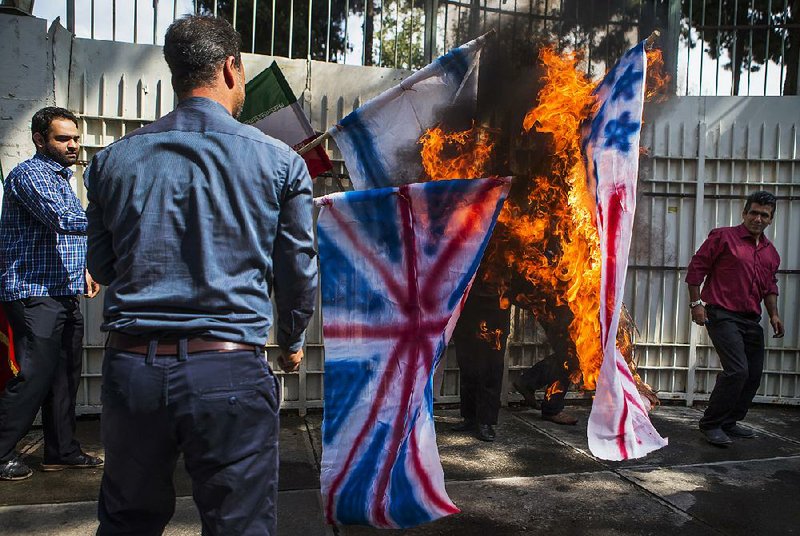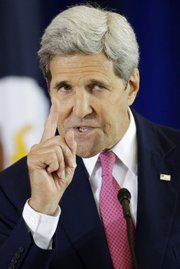WASHINGTON -- President Barack Obama has secured enough votes in the Senate to ensure his nuclear-arms deal with Iran, an agreement that has drawn intense criticism from Republicans and some Democrats.
The agreement to curb Iran's nuclear ambitions was reached by international negotiators in Vienna in July. It has been the subject of intense lobbying in recent weeks by the administration and critics, ahead of a vote that's expected as early as next week on a resolution to block the deal's implementation.
U.S. Sen. Barbara Mikulski, D-Md., on Wednesday said she will back the agreement, making her the 34th senator to pledge support for it. Mikulski is retiring next year after three decades in the Senate.
"No deal is perfect, especially one negotiated with the Iranian regime. I have concluded that this Joint Comprehensive Plan of Action is the best option available to block Iran from having a nuclear bomb," Mikulski said in a statement.
Mikulski's support comes a day after Democratic Sens. Chris Coons of Delaware and Bob Casey of Pennsylvania announced their backing of the deal. Obama now has enough votes to sustain a veto, if Congress tries to derail the agreement through passage of a resolution of disapproval.
There are 10 Democrats who remain undeclared on the issue. Seven more are needed to keep the disapproval resolution from even being considered in Congress.
White House spokesman Josh Earnest called the growing support a validation of Obama's effort to "make sure that every member of the Senate understands exactly what's included in the agreement." He added that the focus is on securing the support of as many lawmakers as possible.
"Every vote is important," he told reporters.
Two Senate Democrats, Charles Schumer of New York and Robert Menendez of New Jersey, have announced their opposition to the deal so far.
Senate Majority Leader Mitch McConnell, R-Ky., acknowledged that opponents of the deal will not be able to block it now that Obama, in his words, has secured "the tepid, restricted and partisan support of one-third of one house of Congress."
McConnell said the deal leaves Iran "with a threshold nuclear capability."
Under the deal, Iran promises to suspend centrifuge work, cut enriched-uranium stockpiles and accept supervision in exchange for a stage-by-stage lifting of sanctions that have hamstrung the Iranian economy.
The deal also sets Iran back so that it is at least a year away from being able to produce enough nuclear material for a weapon. The restrictions would ease after a decade.
Secretary of State John Kerry sought Wednesday to reassure skeptics that the Obama administration would have "zero tolerance" if Iran violated any of the accord's provisions.
"There is no way to guarantee that Iran will keep its word," Kerry said in an hour-long speech at the National Constitution Center in Philadelphia. "But we can guarantee that if Iran decides to break the agreement, it will regret breaking any promise it has made."
Kerry led the U.S. delegation that worked with five other world powers -- Germany, France, the United Kingdom, Russia and China -- to draft the Iranian agreement.
"Rejecting this agreement would not be sending a signal of resolve to Iran, it would be broadcasting a message so puzzling that most people across the globe would find it impossible to comprehend," he told lawmakers and civic leaders.
"It's hard to conceive of a quicker or more self-destructive blow to our nation's credibility and leadership," he said, "not only with respect to this one issue, but across the board, economically, politically, militarily, even morally. We would pay an immeasurable price for this unilateral reversal."
His speech was carried live on Iranian television, an unusual occurrence.
Criticism continues
Congress secured an unusual role for itself in the negotiations earlier this year by passing legislation demanding a chance for lawmakers to review the accord.
Among U.S. lawmakers, debate on the issue has followed party lines. No Republicans have come out to support the deal, and many have denounced it in apocalyptic terms. The bulk of Democrats have rushed to the president's defense.
Sen. Tom Cotton, R-Ark., who has been a vocal critic of the deal, said in a statement that he was disappointed over the 34 Senate Democrats' plan to support it.
"They bowed to White House pressure and put partisan politics ahead of national security and their constituents. The consequences of this decision cannot be overstated and the American people will not soon forget their votes," he said.
The disapproval resolution should still be debated and voted on, he said in regard to the possibility that Democrats would filibuster to derail the resolution.
"On a matter so critical to national security -- one which people on both sides of the debate acknowledge will have generational impacts -- blocking the Senate from voting on a resolution would be an insult to our constitutional system and a black mark on the institution," Cotton said.
Several Republican presidential candidates issued statements Wednesday vowing to undo the Iran agreement if they are elected.
"When I'm president of the United States, we will re-impose those sanctions on Day One," said Sen. Marco Rubio, R-Fla.
"The Iranians have now secured enough votes in the Senate to ensure they have a pathway to a bomb, the missile to deliver it, and the money to pay for it," Sen. Lindsey Graham, R-S.C., said in a statement. "The only reason the Ayatollah and his henchmen aren't dancing in the streets of Tehran is they don't believe in dancing."
Next week, GOP hopefuls Donald Trump and Sen. Ted Cruz, R-Texas, plan to hold a rally outside the Capitol opposing the agreement. Lawmakers return to Washington next week after a five-week recess and are to begin debating the matter.
In the House, the disapproval resolution is likely to pass by a wide margin. But in a letter to fellow Democrats on Wednesday, House Minority Leader Nancy Pelosi said she has the votes to back up an Obama veto.
Because the Obama administration didn't consider it a treaty, ratification isn't dependent on two-thirds approval in the Senate. Instead, Republicans and Democrats agreed on a process that essentially allows the pact to stand if it gains the support of one-third of lawmakers in either chamber, since two-thirds majorities in both would be needed to override a veto of the disapproval resolution.
Supporting Israel, region
Earlier Wednesday, Kerry sent letters to the Senate and House vowing that the Obama administration will strengthen security cooperation with Israel and the nations of the Persian Gulf in the wake of the Iran deal.
He promised that Washington will provide Israel and the Persian Gulf countries enough aid to counter and protect themselves from any Iranian expansionist ambitions in the region.
Kerry described Israel's security as "sacrosanct" and enumerated some of the military aid totaling billions of dollars a year that the United States provides Israel for defense and security. He said the United States and Israel are working on a memo of understanding to "cement for the next decade our unprecedented levels of military assistance."
Kerry said Israel will be the only country in the region to get the advanced F-35 fighter aircraft next year. He said the Obama administration is prepared to increase funds to develop newer systems like the Arrow-3 and David's Sling. He also proposed collaborating with Israel on "tunnel detection and mapping technologies to provide Israel new capabilities to detect and destroy [terrorist] tunnels before they could be used to threaten Israeli civilians."
Kerry said Obama had spoken with Israeli Prime Minister Benjamin Netanyahu about working together to confront conventional and asymmetric threats.
"President Obama and this Administration firmly believe we have an opportunity now to build on and fortify the United States' historic and enduring commitment to Israel's security," he wrote.
In Israel, the immediate reaction to the developments in Washington was muted.
One senior Israeli official close to Netanyahu said, "Whatever is going on in Congress does not change the dangers facing the Middle East from the agreement as it has been currently presented."
The official said Israel never said it would win its argument against the deal but that it was important to make its case.
A second Israeli official indicated that Netanyahu will keep attacking the deal.
"The prime minister has a responsibility to point out the flaws of an agreement that endangers Israel, the region and the world -- and he will continue to do so," they said. "He believes the deal is a mistake."
Israel has railed against the deal, arguing that its conditions will keep Iran perilously close to developing nuclear weapons while enriching a government that has funded anti-U.S. and anti-Israel militants throughout the Middle East.
A spokesman for the American Israel Public Affairs Committee, a pro-Israel lobby, said his group will continue seeking to build further opposition to the deal.
Information for this article was contributed by Karoun Demirjian, Carol Morello, William Booth and Kelsey Snell of The Washington Post; by Erica Werner, Matthew Lee, Josef Federman and Josh Lederman of The Associated Press; by Jonathan Weisman and Michael R. Gordon of The New York Times; and by Sarah D. Wire of the Arkansas Democrat-Gazette.
A Section on 09/03/2015


